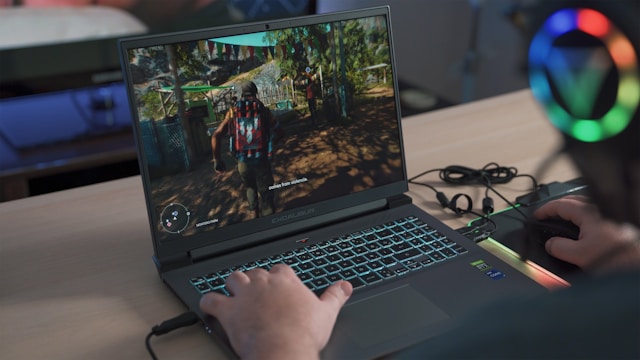Online gaming has exploded in popularity over the past decade, becoming a global phenomenon enjoyed by people of all ages. Whether you’re looking to play casually with friends or dive deep into competitive multiplayer experiences, there’s never been a better time to start. If you’re brand new to gaming, don’t worry this guide will walk you through everything you need to know about online gaming for beginners, from the basics to practical tips on getting started.
What Is Online Gaming?
Online gaming refers to playing video games over the internet, either with or against other players. Unlike offline gaming, which is limited to single-player or local multiplayer modes, online gaming connects you with players from all over the world in real-time. You can compete in fast-paced shooter games, team up in cooperative quests, or even explore vast virtual worlds together.
There are several types of online games, including:
-
MMOs (Massively Multiplayer Online games): Large-scale games like World of Warcraft or Final Fantasy XIV that host thousands of players in persistent worlds.
-
FPS (First-Person Shooters): Action games like Call of Duty or Overwatch that focus on combat and precision.
-
MOBAs (Multiplayer Online Battle Arenas): Team-based strategy games like League of Legends or Dota 2.
-
Co-op Games: Games like Minecraft, Among Us, or Fortnite where players work together or compete in creative ways.
Understanding the differences will help you decide which type of game suits your interests and play style.
Popular Platforms and Devices
If you’re wondering how to start online gaming, your first step is to choose the right platform. Each offers unique benefits depending on your preferences, budget, and the types of games you want to play.
-
PC Gaming: Offers a wide selection of games, customization, and high-quality graphics. Ideal for serious gamers or those who want flexibility.
-
Consoles: PlayStation, Xbox, and Nintendo Switch are the most popular. They offer user-friendly interfaces and access to exclusive titles. Many require subscriptions like PlayStation Plus or Xbox Game Pass for online play.
-
Mobile Gaming: Games like Clash of Clans or PUBG Mobile can be played right from your smartphone. It’s a great entry point for casual gamers.
Each platform has its own online service, and some games are cross-platform, allowing players from different devices to play together.
Creating Your First Account and Gamertag
To play online, you’ll need to create a gaming account, which typically involves setting up a username (known as a gamertag) and connecting to an online service.
Here are a few tips for getting started:
-
Choose a gamertag that reflects your personality, is easy to remember, and is appropriate for public use.
-
Use a strong password and enable two-factor authentication to protect your account.
-
Consider linking your account to your email or phone number for added security.
Your gamertag becomes your identity in the gaming world, so pick something you’ll be comfortable using long-term.
Essential Gaming Equipment and Setup
Before you jump into your first game, it’s important to make sure you have the right equipment. You don’t need a high-end setup to begin, but some basics are essential.
-
Stable Internet Connection: A fast, reliable connection with low latency (ping) is crucial for smooth gameplay.
-
Headset with Microphone: Essential for voice chat and team communication.
-
Comfortable Controller or Keyboard and Mouse: Depending on your platform, make sure your controls feel intuitive.
-
Gaming Chair or Ergonomic Setup: Long sessions can be hard on your body, so good posture matters.
Online gaming for beginners doesn’t require top-tier gear start with what you have and upgrade as you go.
Understanding In-Game Terminology
If you’re new to the scene, gaming terms can sound like a foreign language. Here are a few key terms every newbie should know:
-
XP (Experience Points): Earned by playing, used to level up your character.
-
DLC (Downloadable Content): Additional content you can buy to expand a game.
-
PvP (Player vs. Player): Competitive gameplay against other players.
-
PvE (Player vs. Environment): Cooperative gameplay against computer-controlled enemies.
-
Lag: Delays between your input and the game’s response, often caused by poor internet connection.
-
Ping: The time it takes for your device to communicate with the game server. Lower ping means smoother gameplay.
Don’t stress if you don’t know all the lingo right away—every player starts somewhere, and you’ll pick it up quickly.
Staying Safe Online
Like any online activity, gaming has its risks. Protecting your personal information and avoiding scams is crucial, especially in multiplayer environments.
-
Never share your real name, address, or personal details in chat.
-
Be wary of unsolicited messages offering free items or codes.
-
Report and block players who exhibit inappropriate behavior.
-
If you’re a parent, use built-in parental controls to limit who your child can interact with and how much time they spend playing.
Online safety is an important part of learning how to start online gaming, especially for younger players.
Online Etiquette and Gaming Culture
Gaming communities can be fun and supportive, but also competitive and intense. Following proper online etiquette helps create a better experience for everyone.
-
Be respectful: Whether you win or lose, keep things friendly.
-
Don’t rage quit: Leaving a match mid-game can ruin the experience for others.
-
Use your mic wisely: Communicate clearly and avoid background noise.
-
Avoid toxic behavior: Harassment, trolling, or cheating can get you banned.
Gaming is meant to be enjoyable, and good manners go a long way toward building positive connections.
Choosing the Right Games for Beginners
Not all games are beginner-friendly. If you’re just starting out, try games that are easy to learn, have helpful communities, or offer built-in tutorials.
Some great beginner online games include:
-
Minecraft: Creative and educational, great for all ages.
-
Rocket League: Fun, fast-paced, and simple to understand.
-
Fortnite (No-Build Mode): Offers a forgiving learning curve for new players.
-
Among Us: A light, social game that’s easy to play with friends.
-
Stardew Valley (Co-op Mode): Relaxing and ideal for casual players.
Picking the right game is key to enjoying your first online experience and building your confidence.
Conclusion
Stepping into the world of online gaming may seem overwhelming at first, but with the right guidance and a little patience, it quickly becomes an exciting and rewarding hobby. From learning the lingo to setting up your first game, there’s so much to explore.
Also Visit : Download Youtube Music









